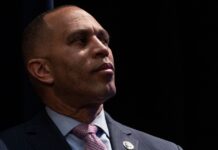
On a warm August night in Kenosha, Washington, a terrified 17-year-old kid approached police officers with his hands raised in surrender. He had just been forced to shoot three men in self-defense during the wave of violence, riots, and looting that followed the 2020 Kenosha police-involved shooting of Jacob Blake, a 29-year-old black man, by a white police officer.
During the trial that followed, an emotional Kyle Rittenhouse recounted the experience, frequently sobbing during his testimony. One of the three men hit him in the neck with a skateboard. Another tried to grab his rifle. The third pointed a handgun at him. He showed up in Kenosha to defend businesses being ransacked by mobs of Black Lives Matter protestors and ended up being assaulted and in fear for his life.
Ultimately, a jury agreed that Rittenhouse acted out of self-defense and was acquitted of all charges.
Rittenhouse didn’t take long to become a celebrity among conservatives. After his trial, he flew to Florida to meet former President Donald Trump at his Mar-a-Lago resort and appeared on Fox News for an interview with conservative host Tucker Carlson.
In November 2023, Rittenhouse released a book, “Acquitted,” outlining his harrowing experience, the highly publicized case, and the controversy surrounding his actions.
Now, Rittenhouse is taking to the road on a national campus tour to advocate for arming students to defend themselves, especially from potential violence from Hamas and Palestinian terrorists on campus. “Every American has a constitutional right to bear arms, and it should not be infringed by a college campus,” he said.
His message has sparked protests and renewed debates over freedom of speech and just how far it should be allowed to go. Similar concerns led to the resignations of the presidents of the University of Pennsylvania and Harvard University, who stepped down after facing intense criticism for not rejecting calls for the genocide of Jews on their campuses.
Legal expert Tom Ginsburg said that while federal regulations require learning environments free of hostility, some inflammatory speech is allowed on campuses as long as it is not directed at a particular group or individual. Unfortunately for many leaders on college campuses, the escalating hostility of pro-Palestinian groups against the Jewish people crosses that line, and their unwillingness to stop the demonstrations has left Jewish students vulnerable.
During a recent appearance at Kent State, Rittenhouse spoke about students facing unthinkable threats – and the inability of campus security or local police to protect them. He points out that while campuses have emergency call boxes that connect to police dispatchers, by the time help arrives, it may be too late.
Critics claim that Rittenhouse isn’t just advocating for gun rights. He is committing a much worse offense – trying to convince the rabid liberals on college campuses to join the conservative movement. His appearances are coordinated by Turning Point USA, a conservative movement playing a vital role in securing votes for Trump in 2024. According to the group, Rittenhouse’s tour isn’t nationally organized. Its on-campus chapters request him to speak at events and rallies.
Paul Prediger, the survivor of the 2020 incident formerly known as Gaige Grosskreutz, has publicly denounced the appearances, claiming Rittenhouse has been capitalizing off of the incident. Prediger says that Rittenhouse is encouraging violence against those who “do not look like or think like them” and those who seek to increase violence against “supposed political, cultural, and religious enemies.”
In response to Prediger’s comments, Rittenhouse reposted a video clip on social media showing his assailant’s admission of pointing a gun at him during the 2020 Kenosha incident.
Ahead of Rittenhouse’s visit to Kent State, protesters organized a walkout, held a vigil, and spray-painted “Welcome, killer” on a campus free speech landmark. A petition on Change.org calling for the cancellation of Rittenhouse’s visit garnered over 3,700 signatures.
Other protests have erupted at several universities in response to Rittenhouse’s speaking engagements. At Western Kentucky University, demonstrators held a sit-in and march. In February, his appearance at East Tennessee State University also triggered protests, and his scheduled appearance at The University of Memphis in March drew numerous complaints. Protesters at the Memphis campus gathered with signs demanding Rittenhouse be imprisoned and not given a platform. Rittenhouse left the stage abruptly amid chants from protesters after about 30 minutes.
Rittenhouse is a polarizing figure whose actions divided a nation. While he acted in self-defense, it’s still a better-forgotten incident. His current “tour” is a baffling decision destined to reignite the debate and open a renewed scrutiny of his actions during that fateful night.
It’s a classic example of a time-tested adage – just because someone can do something doesn’t necessarily mean they should.







